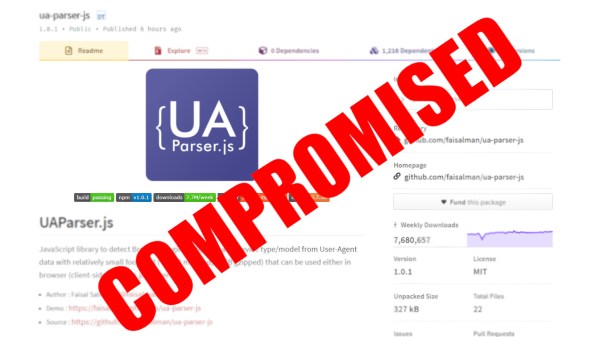Here at Hackaday we love the good kinds of hacks, but now and then we need to bring up a less good kind. Today it was learned that the NPM package ua-parser-js was compromised, and any software using it as a library may have become victim of a supply chain attack. What is ua-parser-js and why does any of this matter?
In the early days of computing, programmers would write every bit of code they used themselves. Larger teams would work together to develop larger code bases, but it was all done in-house. These days software developers don’t write every piece of code. Instead they use libraries of code supplied by others.
For better or worse, repositories of code are now available to do even the smallest of functions so that a developer doesn’t have to write the function from scratch. One such registry is npm (Node Package Manager), who organize a collection of contributed libraries written in JavaScript. One only need to use npm to include a library in their code, and all of the functions of that code are available to the developer. One such example is ua-parser-js which is a User Agent Parser written in JavaScript. This library makes it easy for developers to find out the type of device and software being used to access a web page.
On October 22 2021, the developer of ua-parser-js found that attackers had uploaded a version of his software that contained malware for both Linux and Windows computers. The malicious versions were found to steal data (including passwords and Chrome cookies, perhaps much more) from computers or run a crypto-currency miner. This prompted GitHub to issue a Critical Severity Security Advisory.
What makes this compromise so dangerous is that ua-parser-js is considered to be part of a supply chain, and has been adopted even by Facebook for use in some of its customer facing software. The developer of ua-parser-js has already secured his GitHub account and uploaded new versions of the package that are clean. If you have any software that uses this library, make sure you’ve got the latest version!
Of course this is by no means a unique occurrence. Last month Maya Posch dug into growing issues that come from some flaws of trust in package management systems. The art for that article is a house of cards, an apt metaphor for a system that is only as stable as the security of each and every package being built upon.











